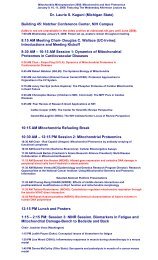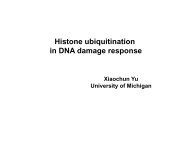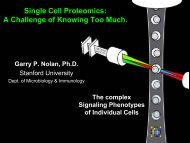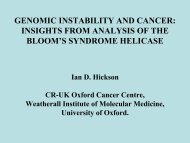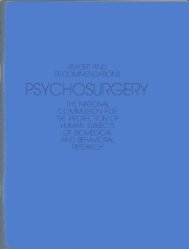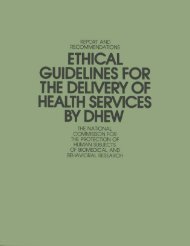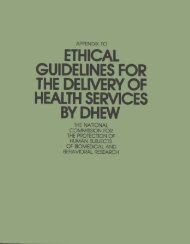RESEARCH ON THE FETUS - National Institutes of Health
RESEARCH ON THE FETUS - National Institutes of Health
RESEARCH ON THE FETUS - National Institutes of Health
Create successful ePaper yourself
Turn your PDF publications into a flip-book with our unique Google optimized e-Paper software.
Richard Wasserstrom, Ph.D.<br />
Dr. Wasserstrom identifies four views concerning the status <strong>of</strong> the human<br />
fetus. He endorses the view that the fetus is in a unique moral category,<br />
closest to that <strong>of</strong> a newborn infant. The fetus has great value because <strong>of</strong> its<br />
potential to become a fully developed human being. It follows that abortion is<br />
morally worrisome because it involves destruction <strong>of</strong> an entity that possesses<br />
the potential to be and to produce things <strong>of</strong> the highest value. It also follows<br />
that if abortion has already taken place and the fetus is nonviable, then<br />
research in no way affects the fetus' ability to realize any <strong>of</strong> its potential.<br />
Dr. Wasserstrom states that the resolution <strong>of</strong> the problem <strong>of</strong> consent for<br />
research on the fetus depends entirely on how one views the status <strong>of</strong> the fetus.<br />
That is, if one views the fetus as tissue, then consent on behalf <strong>of</strong> the fetus<br />
is meaningless. If one views the fetus as a child, then proxy consent is<br />
necessary. Dr. Wasserstrom believes, however, that even if the fetus is considered<br />
to be only tissue, consent should be obtained from the parents out <strong>of</strong><br />
respect for their sensitivities.<br />
Because abortion is a morally worrisome act, the decision to have an<br />
abortion should be kept easily revocable until the time <strong>of</strong> its performance. For<br />
this reason, Dr. Wasserstrom recommends that no research on the fetus in utero<br />
should be permitted if it involves a substantial risk <strong>of</strong> injury to the fetus.<br />
Dr. Wasserstrom concludes that research on the nonviable fetus ex utero<br />
is permissible provided that: (1) the mother (if unmarried) or both parents<br />
consent before the abortion; (2) a review body has determined that the research<br />
may yield important information not otherwise obtainable; (3) the medical<br />
counselors <strong>of</strong> the pregnant woman have in no way been affiliated with the<br />
experimentation; and (4) the fetus is not possibly viable.<br />
(An analysis <strong>of</strong> the papers summarized above was prepared for the Commission<br />
by Stephen Toulmin, Ph.D. This analysis is set forth in its entirety<br />
in the Appendix.)<br />
39



